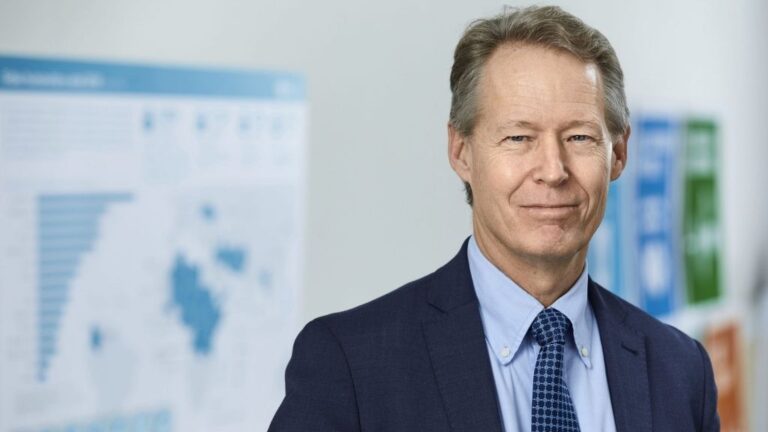Covid-19 has turned difficult progress into setbacks. The latest figures from the World Bank give a gloomy picture in areas such as global poverty, hunger, health and education. But in the midst of a pandemic, we are also experiencing a dramatic acceleration of digitalisation, greater opportunities for equal inclusion and the development of new investment instruments to lift people out of poverty. We must look at the big picture, think long-term and continue to look for more effective levers for change, says Alan AtKisson, department manager at Sida.
In 2015, the world, through the UN, established a system of 17 very ambitious goals to steer the development of humanity towards sustainability until 2030. Now it is 2021. Neither nature nor global politics has been particularly friendly towards the UN's global goals, in recent years. Nature's complex mechanisms have provoked a pandemic caused by a virus from another animal species and also offered intensifying fires and storms that can be linked to climate change. At the same time, the international political arena has strongly distracted us with attacks on democracy and global solidarity as well as chronic conflict along several fronts.
Of course, Covid-19 is partly to blame for our current problems. In too many places and over too many dimensions of sustainable development, the pandemic has turned difficult progress into a setback whose momentum must first be stopped and reversed before positive development can pick up speed again. I am thinking in particular of global poverty, hunger, health and education - global goals 1 to 4 - where the latest figures from the World Bank and other analysis centers show a gloomy picture of lost years and threatened lives.
But the analysis does not end there. The global goals are treated as an interconnected goal system because it reflects how the world actually works. I will not bore the reader with relevant target numbers but you can easily build your own mental system map from the following:
- Girls who are not given the opportunity to get an education lead to twists and turns in gender equality, which in turn affects the pursuit of long-term financial prosperity, which makes it more difficult for girls to get an education.
- People who had climbed above the poverty line but are now falling back usually live in the cities, which hardly contributes to making these cities more sustainable.
- Air traffic has been reduced, which is undoubtedly good for the climate, but it also reduces investment in tomorrow's greener economies that can prevent climate change, save biodiversity and create good jobs for a growing sea of unemployed, especially young people.
So yesterday's positive cycles can be turned into evil. It is undeniably a gloomy situation for us humans, whose professional lives revolve around trying to help the world achieve these widely acclaimed global goals - which are also the starting point for the more specific development goals for Sida, the development assistance authority where I work, and which has been decided by the Swedish government. How is it possible not to be exposed to an erosion of hope?
As always by looking at the big picture, think long term and keep searching for more effective levers for change!
There is no bright side to a global epidemic, but there are unexpected positive events to note and learn from - such as the dramatic acceleration of digitalisation. Profound changes in methods and working methods have been reported wherever there is decent internet. Suddenly, meetings and conferences, which everyone previously thought "had to" be held in physical format, work well on screen. Sometimes these meetings are better: you can include several people on roughly equal terms if you do not have to fly people around the globe and install them in hotels of varying quality. The need has been modern for several digital inventions along with rapid learning progress, and these have shown us that we can change much faster than the most ambitious development plans assumed was possible.
Thanks to these advances, work on sustainable development has not stopped. In some critical areas, it has actually intensified. Think about financing: over the past year, major investment leaders at the global level have pushed the industry towards a stronger position - with more measurable results - in terms of climate change, diversity, gender equality and corporate responsibility in general. Investment flows in developing countries have certainly declined, but new instruments for that investment are being designed, so that as the flow of money eventually accelerates again, there will be several new and potentially more efficient ways for that money to reach the poor.
It is not my purpose to paint a rosy picture of the present and the future with these brief syntheses and personal impressions that have been gathered from dozens of digital meetings, reports, dialogues and conferences. Mankind has a tough road ahead. People living in increasing poverty and oppression have the toughest of all, and I challenge everyone who reads these words to keep that reality in the foreground.
But it is also important to remember that covid-19 has not made it impossible to achieve sustainable development. Of course, it has become much more difficult to achieve these global goals by 2030 - and the deadline was already very ambitious. Nevertheless, covid-19 has also shown us that even in the midst of a global catastrophe for sustainable development, when the goalposts are still moving away from us, we can and must continue to push forward. To work to prevent major damage where needed. Make positive change where we can. And continue to believe that the tide will eventually turn in our favor again.
Because it is the faith that will make it turn.


